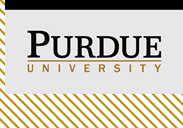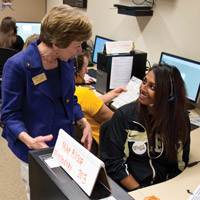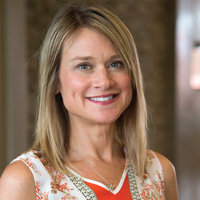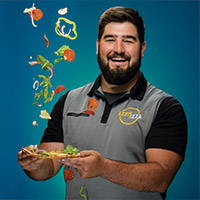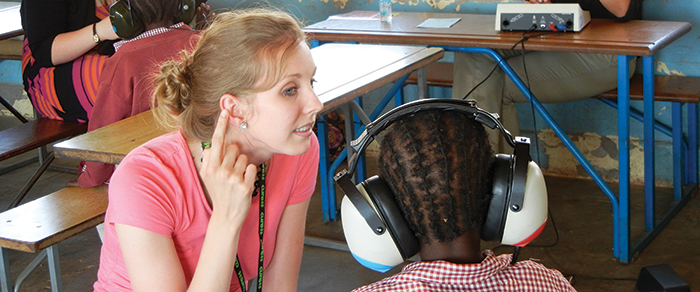
Senior Jessica Lorenz tests a child's hearing. (Photo provided)
In just two weeks, Julia Bergmann learned an important lesson: Don't make assumptions based on someone's appearance. The junior in Speech, Language, and Hearing Sciences (SLHS) traveled to Zambia in May with fellow SLHS students and faculty to provide hearing and speech services to children in need. The service-learning program gives students an opportunity to serve others while gaining clinical experience and expanding their worldview.
"We had this amazing opportunity to work with children who had physical disabilities at a place called Cheshire Homes — and I was expecting to see children confined to wheelchairs or needing help to move around," Bergmann says. "Instead, children were racing around the room, using their arms to support their weight. I found myself not even noticing their disability. I learned right then not to have lower expectations of people based on appearances or stereotypes."
This is the second year for the program, and among the 24 students who have participated so far, there's agreement that they all learned so much more than they served.
"I'm amazed at the amount of life lessons, experiences and information I gained from each individual I met," says Anyea Livers, BS '13. She participated the first year and is now working on a master's in speech, language pathology at Florida State University. "Through this program, I learned skills and lessons that simply cannot be taught in a traditional classroom."
During their two-week stay earlier this year, the students tested or screened more than 350 individuals, mostly children, at hospitals, schools and community centers. Undergraduates gained clinical experience in otoscopy, pure tone and otoacoustic emission screening procedures — something they wouldn't normally get to do until they are in graduate school. Under the supervision of program leaders Lata Krishnan, clinical professor, and Christi Masters, clinical assistant professor and speech pathologist, students as young as sophomores were conducting hearing screenings.
"This sort of experience is amazing and not practiced at the undergraduate level in the states," says junior Megan O'Connell. She was a sophomore when she participated in the 2013 program. She remembers being invited by a physician at Beit CURE Hospital in Lusaka to sit in on patient consultations. "I learned so much more than I ever thought I would."
Senior Rachel Platt says the clinical experience she gained boosted her confidence in her abilities and confirmed she was in the right major. "To have a study abroad program that applies to speech, language, and hearing sciences is not common at many universities," she says. "This was the most clinical experience I've ever had."
The Institute of ENT and Audiology at Beit CURE Hospital is the primary community partner organization for the service-learning program and serves as home base for the Purdue group. The institute provides high-quality, affordable ear, nose and throat care to those in need.
At Beit CURE, students have the opportunity to meet and work with Zambia's only audiologist, Alfred Mwamba, a 2004 Purdue graduate. Mwamba earned a master's in audiology and then returned to his home country to practice. Zambia is home to about 14 million people and nearly half are under 15 years old. Hearing screenings for school-age children are not common practice, and as a result, conditions that can lead to hearing impairment may go undiagnosed and untreated.
"From the beginning, our goal has not been to swoop in and provide our specialized services, but rather to carefully listen to Zambian providers about the needs in their country and see how we can fit our program to their goals," says Krishnan, who first visited Zambia in 2012 to plan the program. "As guests in their country, we feel strongly that we need to respect their decisions and acknowledge that Zambians know best what their country needs."
Just as in real life, the students learned that things don't always go as planned.
"Adaptation was crucial as we worked, something I hadn't experienced before going to Zambia," says senior Alyssa Nymeyer. "You never know what child or adult will walk through your door asking for help, and you may not have all of the tools necessary."
For most students, this experience was their first time to examine patients — and to add to the challenge, some children didn't speak English. Breanne Lawler, a doctor of audiology student, says, "The language barrier contributed to some difficulty in the screenings, but smiles are universal. Communication does not only occur in the form of a shared spoken language."
In addition to overcoming the language barrier with their young patients, the students also saw children with disabilities and learned to adapt testing as needed.
"I was surprised by how determined and inspirational the kids are," says sophomore Amanda Mueller. "They don't define disability the same way we do. Rather than thinking of it as something that prohibits us from doing things, they see it as just another individual trait — something that in no way stops them from being a kid."
Nymeyer agrees and says she had no experience interacting with children with disabilities before the trip to Zambia. "I was unsure how to interact with them, but these kids ended up teaching me so much. Against all odds, they were not being defined by their disability. Interacting with them allowed me to see that they are capable of so much more than I gave them credit."
Krishnan says the goal for the program is to sustain it long-term and expand opportunities as they can. In the program's second year, they were able to add some new clinical activities for students, provide training to Zambian staff on augmentative and alternative communication devices and stuttering, and add two new sites for hearing screenings.
Masters, who supervised the students and led speech and language therapy activities and training, says the number of students going each year isn't likely to increase because supervision of students is critical during the clinical activities.
"This is a rare opportunity for them to get significant hands-on clinical experience and learn more about themselves," she says. "I was really amazed at seeing the students grow substantially in clinical, professional and cultural knowledge in just two weeks."
A blog detailing the students' experiences while they were in Zambia is available at http://slhsinzambia.wordpress.com/.


